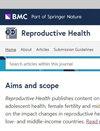影响移民和难民青年性健康和生殖健康及权利的社会生态:参与式行动研究
IF 3.6
2区 医学
Q1 PUBLIC, ENVIRONMENTAL & OCCUPATIONAL HEALTH
引用次数: 0
摘要
本研究探讨了促进澳大利亚大西悉尼地区移民和难民青年(MRY)性与生殖健康和权利(SRHR)体验的社会生态因素。由于文化、语言和系统障碍,移民和难民青年可能面临较高的性健康和生殖健康成果较差的风险。我们采用参与式行动研究方法,与 87 名年龄在 15-29 岁之间、具有不同文化背景的青少年和难民进行了 17 次焦点小组讨论。采用社会生态框架对数据进行了专题分析。在微观系统和外在系统层面确定了促进 MRY 性健康和生殖健康及权利的关键因素,包括:(1)同伴动力和支持,朋友是值得信赖的知己和建议来源;(2)安全和避孕选择,强调获得避孕药具和预防性传播感染的重要性;以及(3)性健康和生殖健康及权利信息获取的数字平台,在线资源填补了知识空白。研究结果表明,性健康和生殖健康及权利干预措施需要利用同伴支持网络,扩大获得避孕选择的途径,并开发适合少数民族文化的数字资源。需要开展进一步研究,以确定和加强所有社会生态层面的促进因素,从而全面支持移民和难民青年的性健康和生殖健康及权利需求。移民和难民青年在新国家往往很难获得性与生殖健康信息和服务。本研究试图了解是什么帮助澳大利亚大西悉尼地区的年轻移民和难民保持其性健康和生殖健康及权利。我们的目的是找出他们所处环境中使他们更容易获得和使用性健康资源的积极因素。我们与 87 名年龄在 15-29 岁、来自不同文化背景的移民和难民青年进行了交谈,并就他们的性健康经历开展了 17 次小组讨论。我们的主要结果显示了帮助这些年轻人的三个重要因素。结果是:(1) 许多年轻人相信他们的朋友会提供有关性健康的建议和信息;(2) 有关于避孕和预防性传播感染的方法的选择非常重要;(3) 互联网,尤其是社交媒体和搜索引擎,是年轻人获得性健康信息的主要来源。了解这些有用的因素可以为更好地支持青年移民和难民提供指导。它表明,性健康项目需要在性健康项目中使用同伴支持,确保年轻人可以轻松获得避孕和保护措施,并创建与文化相适应的、值得信赖的性健康在线资源。我们的研究结果表明,需要开展更多的研究,寻找其他方法来支持年轻移民和难民的性健康和生殖健康。这将有助于为这些年轻人提供更好的健康服务和教育计划。本文章由计算机程序翻译,如有差异,请以英文原文为准。
Socioecologies in shaping migrants and refugee youths’ sexual and reproductive health and rights: a participatory action research study
This study explores socioecological factors facilitating the sexual and reproductive health and rights (SRHR) experiences of migrant and refugee youth (MRY) in Greater Western Sydney, Australia. MRY may be at higher risk for poorer SRH outcomes due to cultural, linguistic, and systemic barriers. Using participatory action research, 17 focus groups were conducted with 87 MRY aged 15–29 from diverse cultural backgrounds. Data were analysed thematically, using socioecological framework. Key facilitators of MRY's SRHR were identified at the microsystem and exosystem levels, including (1) Peer dynamics and support, with friends serving as trusted confidants and sources of advice; (2) Safety and contraceptive choices, highlighting the importance of access to contraception and STI prevention; and (3) Digital platforms for SRHR information access, with online resources filling knowledge gaps. Findings suggest the need for SRHR interventions to leverage peer support networks, expand access to contraceptive options, and develop culturally appropriate digital resources for MRY. Further research is needed to identify and enhance facilitators across all socioecological levels to comprehensively support MRY's SRHR needs. Migrants and refugee youth often struggle to access sexual and reproductive health information and services in their new countries. This study is an attempt to understand what helps young migrants and refugee maintain their sexual and reproductive health and rights in Greater Western Sydney, Australia. Our aim was to identify the positive factors in their environment that make it easier for them to access and use sexual health resources. We talked to 87 migrants and refugee youth aged 15–29 from various cultural backgrounds, conducting 17 group discussions about their experiences with sexual health. Our main results show three important factors that help these young people. The results were, that (1) Many young people trust their friends for advice and information about sexual health, (2) Having choices about contraception and ways to prevent sexually transmitted infections was important, and (3) The internet, especially social media and search engines, is a major source of sexual health information for young people. Understanding these helpful factors can guide better support for young migrants and refugees. It shows sexual health programs need to use peer support in sexual health programs, make sure young people can easily access contraception and protection and create trustworthy online resources about sexual health that are culturally appropriate. Our findings show more research is needed to find other ways to support young migrants and refugees with their sexual and reproductive health. This will help create better health services and education programs for these young people.
求助全文
通过发布文献求助,成功后即可免费获取论文全文。
去求助
来源期刊

Reproductive Health
PUBLIC, ENVIRONMENTAL & OCCUPATIONAL HEALTH-
CiteScore
6.00
自引率
5.90%
发文量
220
审稿时长
>12 weeks
期刊介绍:
Reproductive Health focuses on all aspects of human reproduction. The journal includes sections dedicated to adolescent health, female fertility and midwifery and all content is open access.
Reproductive health is defined as a state of physical, mental, and social well-being in all matters relating to the reproductive system, at all stages of life. Good reproductive health implies that people are able to have a satisfying and safe sex life, the capability to reproduce and the freedom to decide if, when, and how often to do so. Men and women should be informed about and have access to safe, effective, affordable, and acceptable methods of family planning of their choice, and the right to appropriate health-care services that enable women to safely go through pregnancy and childbirth.
 求助内容:
求助内容: 应助结果提醒方式:
应助结果提醒方式:


